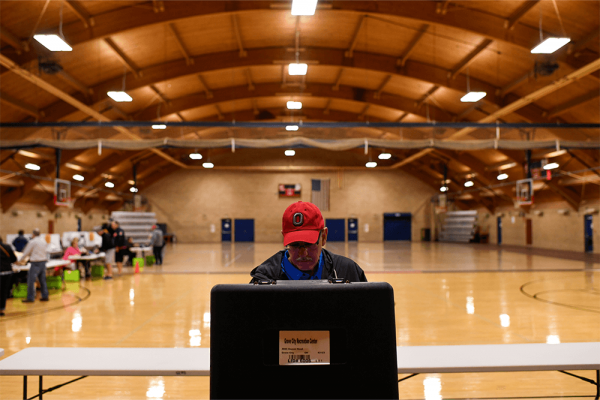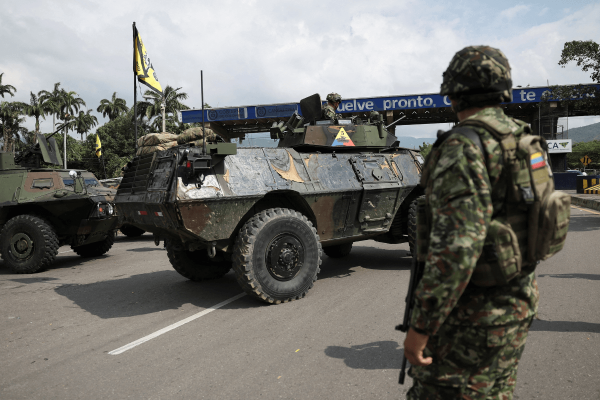“Blessed are the peacemakers, for they shall be called the children of God,” Jesus preaches in Matthew 5:9.
Next week, U.S. midterm voters will determine the balance of power in both houses of Congress and countless other elected positions across the country, including our governors, mayors, and attorneys general. Yet as we near Election Day, the level of political vitriol and the threats of violence we’re seeing feel unprecedented.
Last week, U.S. security agencies including the Department of Homeland Security and the FBI, warned of increased risk of attacks on political candidates, election officials, religious minorities, poll workers, and voters. That same day, a man attacked U.S. House Speaker Nancy Pelosi’s husband, Paul, in their San Francisco home; officials called it an “intentional” attack aimed at Speaker Pelosi. One in 6 election officials report that they’ve already been threatened or intimidated due to their work; a recent Reuters survey found that 2 in 5 U.S. voters are worried about threats of violence or voter intimidation at the polls. In a speech yesterday, President Joe Biden offered a powerful case that democracy is on the ballot, stating clearly that there is “no place for voter intimidation or political violence in America, whether it’s directed at Democrats or Republicans.”
These threats and the deep-seated anxiety and fears around the election are tied to increasingly violent rhetoric on the campaign trail, particularly among the growing share of Republican candidates who are sowing further distrust and resentment toward our electoral system by doubling down on “the Big Lie” that the 2020 election was stolen. Many of these candidates have even refused to say whether they will accept the results of the 2022 election.
Yet, in this charged atmosphere, Jesus calls us to be peacemakers — regardless of our political leanings or party affiliation. So, what does peacemaking look like during the upcoming midterms?
To be peacemakers, we must first resist the urge to feel powerless and disheartened. After all, that’s exactly what anti-democratic forces want: to gain greater power by sowing fear, disillusionment, and apathy. This is what we saw former President Donald Trump do in the aftermath of the 2020 election; he wanted to hang on to power, so he spread “the Big Lie” of a stolen election and, as the January 6 Committee has demonstrated with searing evidence, tried to subvert and overturn the results.
So instead of feeling fatalistic about the midterm election, let’s be clear about what we are voting for: justice and the common good. Trump ultimately failed because dedicated public servants from both parties refused to go along with him. In the upcoming election, voters will decide who should serve in many of these public servant roles. Nearly every state has at least one candidate on the ballot who denies the legitimacy of the 2020 election. We vote to ensure our elected leaders — secretaries of state, state attorneys general, and even governors — are people who will fairly administer future elections.
We also must connect the dots that safeguarding and strengthening our democracy impacts every other issue we care about, including fair wages, inflation, poverty, affordable housing, reproductive rights, reducing crime, climate justice, and so much more.
Being a peacemaker amid election-based threats and fears also means finding tangible ways to help people vote, stay safe while they do so, and ensure that their vote is counted. I’ve said it before and I’ll keep saying it: Ensuring everyone can exercise their sacred right to vote is a fundamental expression of faith and discipleship. In theological terms, protecting people’s freedom to vote is an expression of our belief that all people are created in the image of God (Genesis 1:27) — imago dei.
One example of this practical peacemaking is Sojourners’ #LetJusticeFlow campaign which has been working to empower people of faith to ensure they and their communities are registered and have the information they need to know how and where to cast their vote.
Another example of this kind of practical peacemaking is the Faiths United to Save Democracy campaign which has been working since the 2020 election to assemble and train a multi-racial, multi-faith, and intergenerational coalition of faith leaders who will protect the freedom to vote. Through the campaign, which is co-convened by the Skinner Leadership Institute, Sojourners, and the Georgetown Center for Faith and Justice and involves a diverse group of national partners, we have conducted nonpartisan voter registration and voter education. We’ve worked to protect the vote by mobilizing faith leaders to meet with senior election leaders and secretaries of state; we want these leaders to know that we will hold them accountable for conducting a free, fair, and safe election.
Faiths United has also trained more than 700 poll chaplains who will spend Election Day serving as a moral presence to deter voter suppression and violence, working to troubleshoot challenges, and keeping voters safe in precincts across 10 states, especially in communities where voters of color and others might face intimidation. If tensions run high at these polling places, these trained faith leaders will be ready with de-escalation tactics to deter and diffuse any conflict that could lead to violence. On Election Day, I’m excited to be joining Rev. Alyn Waller, who is leading Faiths United’s work in Pennsylvania, to support poll chaplains across Philadelphia. Witnessing such a diverse group of faith leaders respond to this call has been incredibly inspiring and heartening.
Throughout the poll chaplain trainings, Faiths United has stressed that this movement is part of a historic and sacred legacy. Barbara Williams-Skinner, who leads the Skinner Leadership Institute, reminded participants that these 2022 poll chaplains are reminiscent of the civil rights movement leaders who courageously worked against voter suppression laws to register people to vote in Mississippi during the Freedom Summer of 1964. Jim Wallis, who leads the Georgetown Center for Faith and Justice, has emphasized that by protecting the freedom to vote and by extension our democracy we are building a “imago dei movement.”
So if you hear reports of organized intimidation and violence this Election Day, don’t give into that feeling of powerlessness or cynicism. People of faith and other peacekeepers can be a powerful force to protect our increasingly fragile democracy; together, we can ensure that all Americans are able to vote in a safe, free, and fair election.
Got something to say about what you're reading? We value your feedback!






